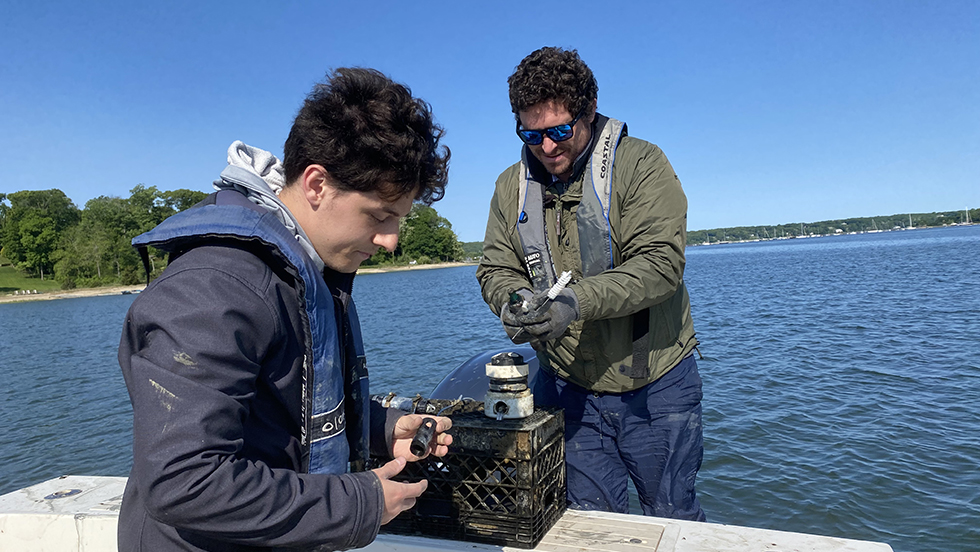
Susan Kilgore, PhD, assistant professor, and Ryan Wallace, PhD, assistant professor, receive National Science Foundation subaward to guide, retain and enroll students in coastal geosciences.
When Ryan Wallace, PhD, joined the Department of Environmental Studies and Sciences as an assistant professor in 2020, the department was poised for a growth spurt. Adelphi was cementing a leadership role in mitigating the negative impact of climate change on the Long Island Sound through projects ranging from restoring once-prolific oyster beds to measuring the threat posed by algal blooms.
“Within the last year or two, we’ve seen significant growth in the department,” said Dr. Wallace. “When I came on board, there were only two graduate students. This fall, 15 are enrolled” in the Master of Science in Environmental Studies program.
To further spur growth, Dr. Wallace, together with colleague Susan Kilgore, PhD, assistant professor, are working to build a pipeline between Adelphi and Molloy University to prepare, retain and enroll the next generation of coastal geoscientists.
A Comprehensive, Collaborative Project
The professors have received a subaward of a $407,527 National Science Foundation (NSF) GEOPaths—Pathways Into the Geosciences—Earth, Ocean, Polar and Atmospheric Sciences—grant in conjunction with Molloy University to do just that.
The three-year award supports the Adelphi and Molloy researchers’ comprehensive Project RESTORES—Retention of Earth Science Trainees through Opportunities in Restoration and Environmental Sciences. “It’s great to see competing institutions working together on a project like this,” said Dr. Wallace.
According to Dr. Wallace, the grant will enable the universities to develop a collaborative pathway that funds students from underrepresented minority groups from local high schools and community colleges interested in pursuing undergraduate as well as graduate studies in the coastal geosciences.
Equally important, the students will benefit from the kinds of relevant hands-on internship and research opportunities that are likely to resonate with a growing workforce.
A Serendipitous Collaboration
“This is a great award, and one that was not really planned or expected for Adelphi,” Dr. Wallace said. It is, in fact, an award that came about almost coincidentally.
In talking with a newly enrolled graduate student, Dr. Wallace discovered that he had worked with Elizabeth Suter, PhD, an assistant professor of environmental science at Molloy with whom he’d collaborated in the past.
Dr. Wallace learned when reaching out to Dr. Suter that she was applying for an NSF grant to support students in the geosciences from underrepresented groups. “One of the issues for her, though, was that Molloy has no graduate program in the geosciences, so she wondered if we could support a pipeline for Molloy undergraduates to conduct research at Adelphi,” he recalled.
He realized that developing a partnership with Molloy to establish a pipeline that immerses Molloy students as interns in his own summer geocoastal research projects—such as his work this past summer on harmful algal blooms in the Long Island Sound and ongoing oyster restoration projects in North Shore waters—would be “a perfect fit” for both institutions.
Additionally, Dr. Wallace brought departmental colleague Dr. Kilgore—who is currently developing a project that will explore how sedimentation affects oyster habitats—on board for her expertise in geology and her research work with sediments. “Students will also have opportunities to work with other Adelphi faculty on research projects,” he said.
A Working Collaboration
According to Dr. Wallace, Molloy is the leader for recruiting students as well as developing a framework to support and retain them. While preliminary planning is currently underway, Project RESTORES will launch officially next fall, when the first cohort of local students from underrepresented and minority groups being recruited by Molloy will matriculate. Then, in Summer 2025, the first student interns will begin working with Adelphi faculty.
Dr. Wallace reported that he is currently hoping to reach an articulation agreement with Molloy that would ultimately allow those and other interested students to matriculate into Adelphi’s environmental studies and sciences graduate program.
He predicted that, “One of the most important things about this is that we’re aiding the building of a larger workforce with students coming out of college with knowledge about our local environmental issues.”
Dr. Kilgore agreed by noting that, “In general, getting experience with restoration projects and research that can lead to oyster restoration and other geoscience projects will be helpful with their careers. There’s a growing need for people with knowledge and experience in this area. And by the time they are out of graduate school, more jobs will be available for these projects.”